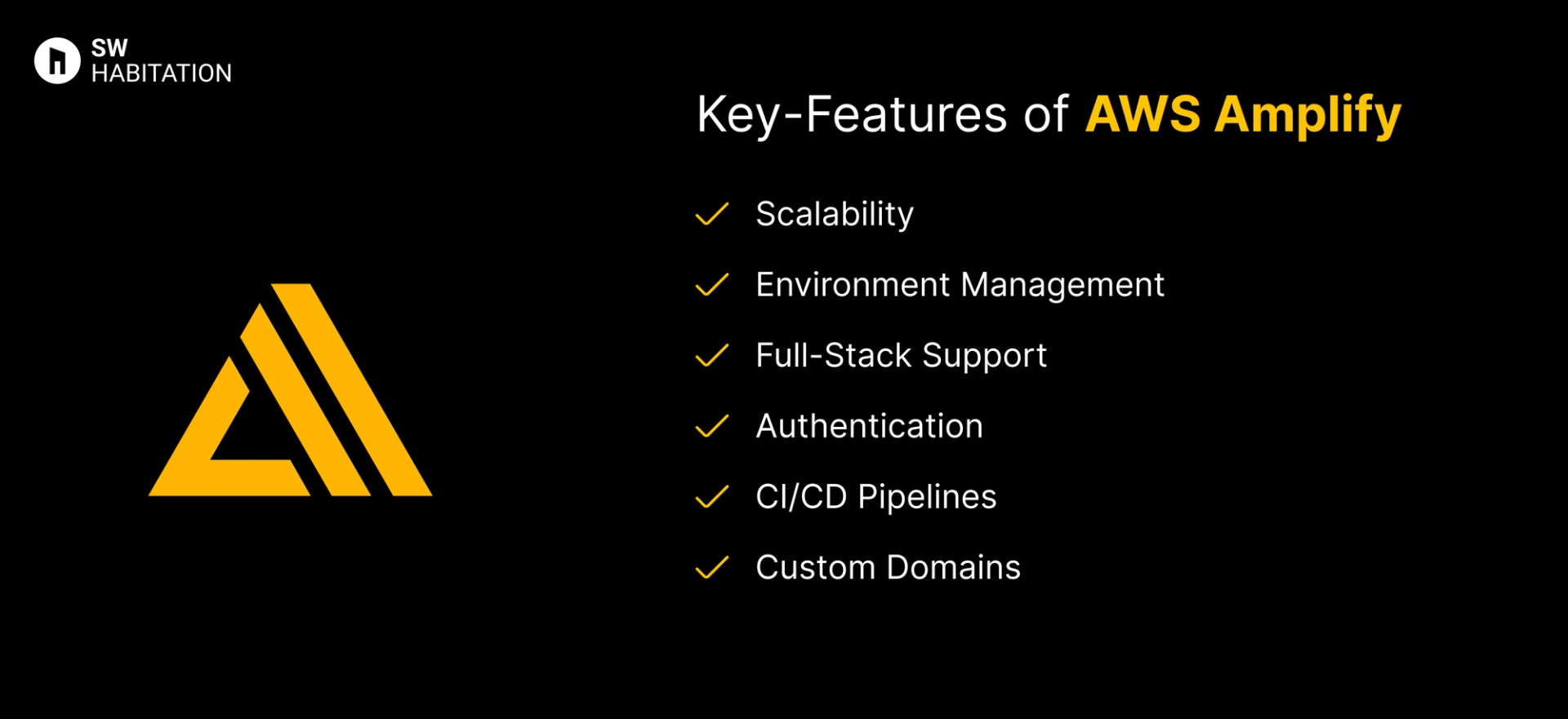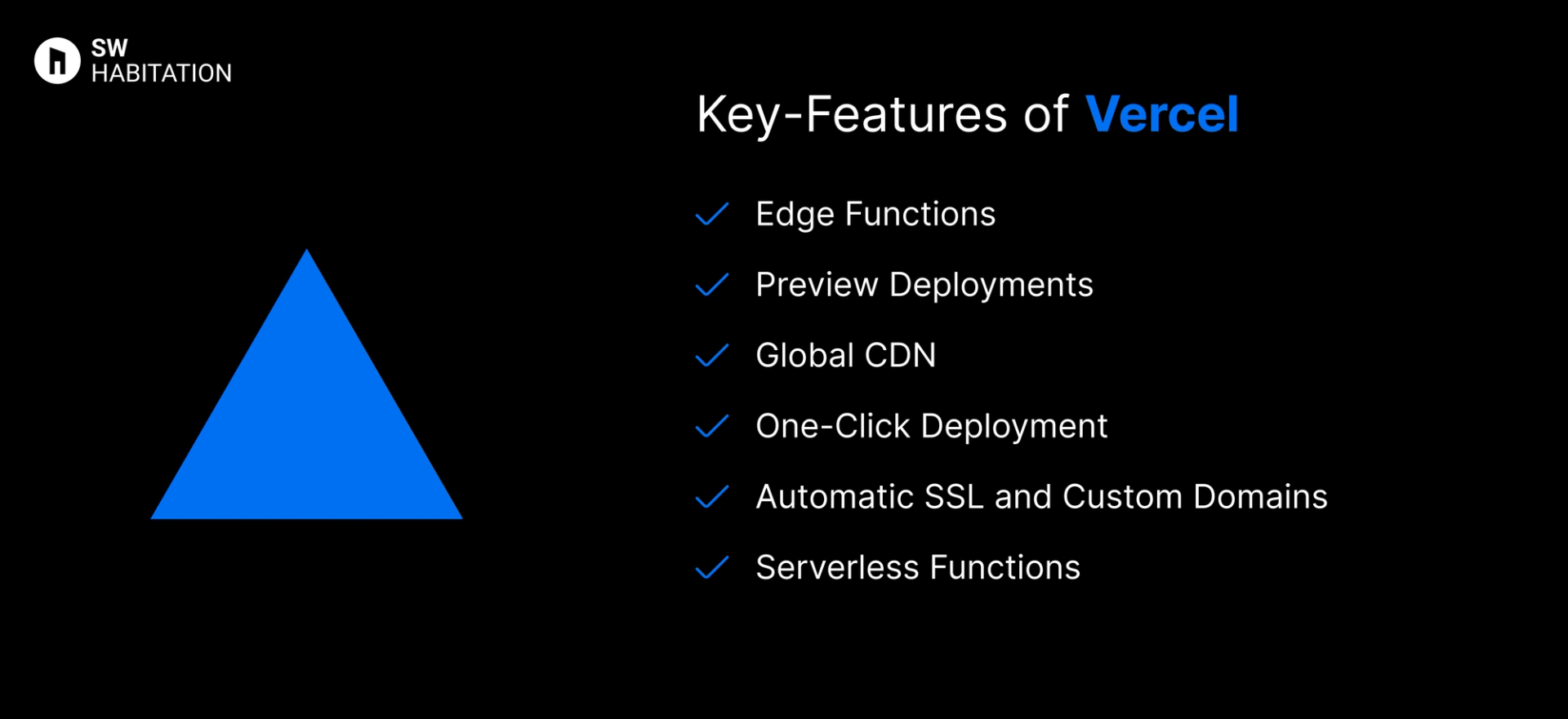AWS Amplify vs. Vercel

AWS Amplify

Vercel
You know when you’ve finished building your website and just want to get it online without dealing with all the techy stuff? That’s where deployment platforms help. They make it super easy to put your site live, just connect your code, click a button, and it’s up and running. No need to worry about servers or complicated setups.
They also take care of the important things like speed, security, and updates in the background. So while they handle the heavy stuff, you can focus on making your website look good and work great. It's simple, right?
What is AWS Amplify?
AWS Amplify is a deployment platform by Amazon Web Services that simplifies building and hosting full-stack applications. It provides tools to connect frontends to backends, manage app hosting, and scale effortlessly. Whether you’re working with static sites, dynamic apps, or serverless functions, Amplify has your back.
Key Features of AWS Amplify


- Scalability: Automatically scales with traffic, no manual intervention needed.
- Environment Management: Create separate environments for dev, staging, and production.
- Full-Stack Support: Deploy frontend and backend from a single platform.
- Authentication: Easy integration with Amazon Cognito for user management.
- CI/CD Pipelines: Automatic builds and deployments with every code push.
- Custom Domains: Connect your own domain with SSL certificates included.
Advantages of AWS Amplify
- Custom Domains and SSL: Free SSL and easy domain setup.
- Great for Serverless Apps: Perfect for serverless architectures.
- All-in-One Solution: Handles frontend, backend, and deployment seamlessly.
- CI/CD Out of the Box: Push code, and Amplify automatically builds and deploys.
- Integrated with AWS: Leverage the full power of AWS services like Lambda, S3, and DynamoDB.
Disadvantages of AWS Amplify
- Vendor Lock-In: Deep integration with AWS means it’s harder to migrate to other platforms later.
- Learning Curve: Familiarity with AWS services is helpful but can be overwhelming for beginners.
- Cost Complexity: Pricing can get confusing as your app scales and uses more AWS services.
What is Vercel?
Vercel is a cloud platform for deploying and hosting frontend applications. It excels at making continuous deployment and global delivery feel seamless. Vercel is the company behind Next.js, so if you’re building a Next.js app, this platform is pretty much a match made in heaven. But don’t worry it also supports other frameworks like React, Vue, and Svelte.
Key Features of Vercel


- Edge Functions: Run code at the edge for lightning-fast responses.
- Preview Deployments: Get a unique preview URL for every pull request, making collaboration a breeze.
- Global CDN: Automatically deploys content across a global content delivery network for fast performance.
- One-Click Deployment: Push to GitHub, GitLab, or Bitbucket and deploy instantly.
- Automatic SSL and Custom Domains: Set up your custom domain with HTTPS in seconds.
- Serverless Functions: Add backend logic without managing infrastructure.
Advantages of Vercel
- Great for Collaboration: Preview links for every branch or pull request.
- Effortless Deployment: Connect your repo, and Vercel takes care of the rest.
- Serverless Functions: Easily add backend functionality with zero infrastructure headaches.
- Free Tier: Generous free plan for personal projects.
- Next.js Native: Built by the same team behind Next.js, ensuring top-notch support.
- Blazing Fast: Deploys across a global CDN automatically.
Disadvantages of Vercel
- Learning Curve for Advanced Features: Basic deployment is simple, but advanced features like edge functions require deeper knowledge.
- Vendor Lock-in: Tightly integrated with Next.js, making migration trickier if you switch stacks.
- Limited Backend Support: Focuses on frontend — complex backends need other services.
- Pricing Can Add Up: The free plan is great, but costs can grow quickly with more traffic and features.
Comparison Between AWS Amplify vs Vercel
Use Cases of AWS Amplify
- Enterprise Apps: Ideal for large-scale applications needing robust infrastructure.
- Rapid Prototyping: Quickly spin up apps with authentication, storage, and APIs.
- Full-Stack Applications: Manage both frontend and backend in one place.
- Serverless Applications: Leverage AWS Lambda and API Gateway.
Use Cases of Vercel
- Enterprise-Scale Projects: Handles high-traffic apps without breaking a sweat.
- Prototyping and Demos: Instant preview URLs make collaboration smooth.
- Jamstack Sites: Ideal for static sites and serverless functions.
- Next.js Applications: Native support makes deploying Next.js apps a dream.
Other Resources
Conclusion
Deployment platforms are a total game changer if you’re looking to launch your website quickly, reliably, and without any trouble. Whether it’s a personal portfolio, a startup site, or a growing business platform, they handle the technical heavy lifting like hosting, security, and scalability so you can stay focused on building great experiences for your users.
You’re not boxed into a single approach. Most platforms integrate smoothly with the tools and frameworks you already love, letting you deploy directly from your Git repository, preview updates, and roll back with ease. With lightning-fast performance and dependable uptime, deployment platforms simplify the path from code to production. Pick the one that aligns with your workflow, and you’re all set to launch with confidence 🚀
Frequently asked questions
Is AWS Amplify free?
It has a free tier, which is great for testing and small apps. Paid usage kicks in based on bandwidth, storage, and build time.
Is AWS Amplify good for static sites?
Amplify is great for static sites and JAMstack apps, and it includes global CDN hosting, caching, and atomic deployments.
Does AWS Amplify support CI/CD?
Yes, Amplify has built-in CI/CD, just connect your Git repo (GitHub, GitLab, Bitbucket), and it auto-deploys on every push.
What can I build with AWS Amplify?
You can build and deploy full-stack apps with frontends (React, Vue, Angular, etc.) and backends (APIs, databases, authentication) using AWS services.
Is Vercel free to use?
Yes, there’s a free tier with generous limits, perfect for hobby projects, portfolios, and early-stage startups.
How easy is deployment with Vercel?
So easy connect your GitHub/GitLab/Bitbucket repo, and Vercel handles builds, previews, rollbacks, and deployments instantly.
Does Vercel include serverless functions?
Yes, You can run API routes/serverless functions as part of your deployment no need to manage a separate backend.
What frameworks does Vercel support?
Vercel is optimized for Next.js, but it also supports React, Vue, SvelteKit, Nuxt, Astro, and static site generators like Hugo and Eleventy.
